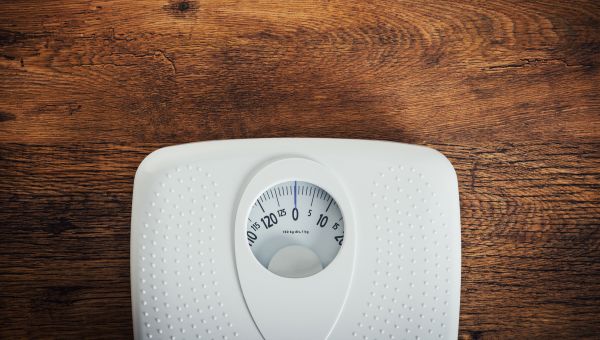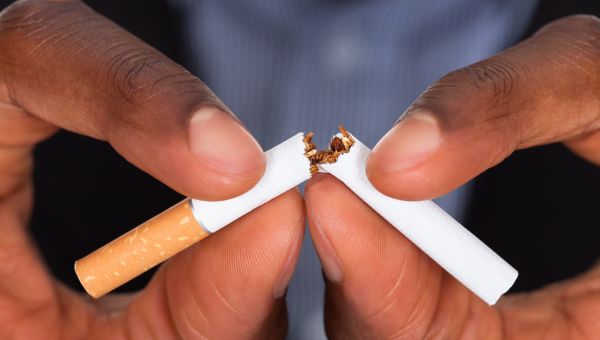6 myths about quitting smoking that could be keeping you sick
Don't let these misconceptions keep you from dropping the habit.
Updated on August 6, 2024

You probably know that smoking has countless negative effects on your health, from discolored teeth to heart disease and stroke, to the development of cancers. But even knowing all that, quitting can be extremely difficult. It doesn’t help that there are lots of common misconceptions about quitting smoking that may get in the way of successfully dropping the habit.
According to 2021 statistics from the Centers for Disease Control and Prevention (CDC), 11.5 percent of adults in the United States smoked cigarettes and 4.5 percent used electronic cigarettes. If you’re part of that group, it’s time to kick the habit. Not sure where to begin? Start by forgetting these common myths about smoking cessation.

Myth: You’ll Gain A Lot of Weight When You Quit
Most smokers who quit do gain some weight, estimated at 5 to 10 pounds. But the health benefits of quitting far outweigh the downsides of a possible moderate weight gain.
A 2019 review published in European Cardiology found that in those people who do gain a little weight after quitting, that downsides that come from weight gain may cancel out the heart benefits you get from quitting. But that only appears to apply to the short term. Once a year had passed since quitting smoking, the improvements in heart health you get from quitting are much stronger than the small increase in health risk from the weight gain.
The benefits for diabetes were similar. Researchers found that the long-term benefits of quitting smoking far outweighed any short-term health downsides related to weight gain. Throughout the review, researchers emphasized that quitting smoking is an overwhelmingly healthy choice.
If managing your weight is a concern for you, know that most weight gain occurs within three months of quitting, so that is a critical time to watch calories, eat a healthy diet, and get regular exercise. Quit aids and medication may also help limit weight gain during this time.

Myth: Quitting is expensive
This myth is easy to debunk. Smoking cessation treatments, like patches or counseling, may be available at no or minimal cost. Meanwhile, the cost of a pack of cigarettes went up by nearly 30 percent in the period between 2015 and 2021. As of 2023, a pack can run almost $12 in some states. That’s nearly $4,380 per year for a pack-a-day smoker. For the individual smoker, the out-of-pocket cost of buying cigarettes can run as high as several hundred thousand dollars over a lifetime.
But that’s not the only way that smoking costs you money. There’s also a financial opportunity cost—the loss of money you could have made had you invested the cash you spent on cigarettes. For example, a person in New York who spends $226,000 on cigarettes over their lifetime could lose out on $4 million in their retirement funds that could have been made if that money had been smartly invested.
Meanwhile, the healthcare costs that come from smoking add up, too—up to several hundred thousand dollars per smoker over a lifetime. On a society level, smoking-related illnesses and loss of productivity chalk up more than $600 billion in U.S. spending each year.
Many insurance companies offer incentives and discounts for smoking cessation and cover the cost of quit aids, so check with your provider. The CDC also offers info on accessing free Quitlines or online services dedicated to helping people quit smoking.

Myth: When You Smoke, You’re Only Hurting Yourself
Your smoking habit doesn’t only affect your health: Nonsmokers can be exposed to over 7,000 chemicals found in secondhand smoke. In fact, according to the CDC, secondhand smoke causes 34,000 premature heart disease deaths among nonsmoking adults every year in the U.S. It also increases the risk of stroke and lung cancer deaths in those who do not smoke. Secondhand smoke also increases the risk of asthma, respiratory symptoms and infections, ear infections, and even sudden infant death syndrome (SIDS).

Myth: There Are Safe Smoking Alternatives to Cigarettes
If you’ve swapped cigarettes for cigars, snuff, chewing tobacco, or electronic cigarettes, you’re still exposing yourself and those around you to toxic substances. Not only are they highly addictive tobacco products, but they’ve been linked to many cancers.
Smokeless tobacco can cause cancers of the mouth, pharynx, larynx, esophagus, and pancreas. It can also cause gum disease and tooth decay or loss and can increase the risk of deadly heart attacks and strokes. Cigars can cause damage similar to cigarettes. And e-cigarette aerosol contains harmful chemicals and particles that can be inhaled into the lungs, some of which may be linked to outbreaks of a condition called e-cigarette, or vaping, product use-associated lung injury (EVALI).
The bottom line? There’s no risk-free level of tobacco use, whether it comes in the form of a cigarette or a vape.

Myth: You’ll Lose Your Social Circle When You Quit
Smoking is often considered a social activity, but quitting doesn’t mean you’ll lose your friends. The key is to explain why quitting is important to you. You will likely find that your friends want to help you succeed. Tell them how they can help support you.
You may simply ask smoking friends to avoid smoking in your presence or ask them to join you in nonsmoking activities and be available when you are struggling with cravings. You could even inspire some fellow smokers to quit.

Myth: Quitting Is Too Hard
It’s true that it can take several attempts to quit smoking. But don’t feel discouraged if you have a slip-up. Rather, take the time to assess the situation: What made you crave a cigarette? How can you overcome cigarette cravings in the future? Try to take control of those stressful situations so you can finally kick the habit and the addiction to nicotine.
According to the CDC, there are two big reasons why quitting smoking is hard. The first is the chemical addiction to nicotine. The second is re-writing and re-wiring your habits and daily routines to not include smoking. The CDC recommends using quit-smoking medicines so that you don’t have intense cravings and withdrawal symptoms. This lets you concentrate on learning new routines and crafting a new daily lifestyle that isn’t connected to smoking.
You can join the 61.7 percent of adult former smokers who have been able to quit!

Ali FRM, Seaman EL, Schillo B, et al. Trends in Annual Sales and Pack Price of Cigarettes in the US, 2015-2021. JAMA Netw Open. 2022 Jun 1;5(6):e2215407.
American Cancer Society. Health Risks of Smokeless Tobacco. Page last updated October 28, 2020.
Carter, Rebekah. “A Guide to Cigarette Prices by State in 2023.” Moneyzine. October 17, 2023.
Centers for Disease Control and Prevention. About Electronic Cigarettes (E-Cigarettes). Page last reviewed November 2, 2023.
Centers for Disease Control and Prevention. Cigarette Smoking in the U.S. Page last reviewed May 4, 2023.
Centers for Disease Control and Prevention. Economic Trends in Tobacco. Page last reviewed July 26, 2022.
Centers for Disease Control and Prevention. Health Problems Caused by Secondhand Smoke. Page last reviewed November 1, 2022.
Centers for Disease Control and Prevention. Smoking Cessation: Fast Facts. Page last reviewed March 21, 2022.
Centers for Disease Control and Prevention. Tips For Quitting. Page last reviewed September 12, 2023.
Centers for Disease Control and Prevention. Why Quitting Smoking Is Hard. Page last reviewed September 12, 2023.
Hasegawa K, Komiyama M, Takahashi Y. Obesity and Cardiovascular Risk After Quitting Smoking: The Latest Evidence. Eur Cardiol. 2019 Apr;14(1):60-61.
McCann, Adam. “The Real Cost of Smoking by State (2024).” WalletHub. January 10, 2024.
U.S. National Library of Medicine MedlinePlus. Weight gain after quitting smoking: What to do. Page last reviewed August 15, 2022.
More On


video

article

slideshow


video


video
